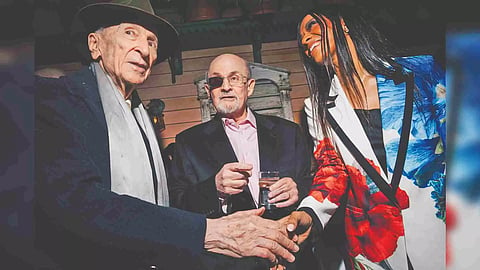

ALEX VADUKUL
Three security guards stood along a leafy street in the West Village of Manhattan last Thursday evening, watching as a procession of writers, editors and publishing industry veterans entered the Waverly Inn restaurant for a book party. The security team was present because this wasn’t just any book party.
It was a gathering for the release of “Knife: Meditations After an Attempted Murder,” a new memoir by Salman Rushdie, in which he examines how his life was altered by a violent stabbing nearly two years ago, when he was attacked onstage at the Chautauqua Institution in western New York.
The episode temporarily placed Rushdie on a ventilator and left him blind in his right eye. (The suspect, Hadi Matar, has pleaded not guilty to charges of attempted murder and assault.)
When Rushdie, 76, arrived in the Waverly Inn’s garden, friends and fellow writers hugged him. He wore a pink shirt, a blazer and a pair of eyeglasses with a black-tinted right lens. His wife, the poet Rachel Eliza Griffiths, stood at his side.
The room was filled with literary power players, including the agent Andrew Wylie, the writer Marlon James and the editor Graydon Carter, whose digital publication, Air Mail, hosted the event. “The writing process is catharsis,” Danza said. “If Salman is using this book to process the horrible thing that happened to him, that takes guts.”
The memoir is under a strict embargo, so there were no copies of the book at the party. And because Anderson Cooper conducted an interview with Rushdie set to air on “60 Minutes” on Sunday, he wasn’t fielding many questions from journalists. But he did take a moment to describe why he had decided to write a memoir in the wake of the attack, rather than another novel.
“Well, I tried to write other things afterward, but they were all nonsense,” Rushdie said. “So I decided that I finally had to pay attention to the elephant in the room.” The attempt on his life came more than three decades after the leader of Iran, Ayatollah Ruhollah Khomeini, issued a fatwa calling for Rushdie’s death after the publication of his novel “The Satanic Verses,” which fictionalized parts of the life of the Prophet Muhammad and included depictions that many Muslims considered blasphemous. Major book chains refused to stock the book for a time, and Rushdie lived in hiding for nearly a decade.
At the party, Gay Talese recalled how, after the fatwa was issued in 1989, writers including himself, Norman Mailer and Susan Sontag participated in a PEN America public reading of selections from “The Satanic Verses” to support him. “Me and Mailer and Sontag, we wondered if we were going to be shot,” Talese said. “The question was whether there would be someone in the audience who would avenge further for the Ayatollah.”
“Thirty years of being a marked man of letters, can you imagine living like that?” Talese added. “I’d only hope to have the same kind of grace that Salman has living with such a circumstance. For a man afflicted with such tragedy and disturbance in his life, he’s still such a cheerful guy.”